The First Trump Term, Economic Indicators Edition
Some comparative data.

So, I keep seeing it come up about how great the first Trump economy was. And, I will admit that the first three years were fine if not good. They were not radically different, I would note, from the economic indicators during the second Obama administration. This is something I recall discussing at the time. My point, to be clear, is not to say that the pre-Covid Trump economy was bad, but to note that it was hardly remarkable.
I would note that any real assessment of Trump’s first terms should include all four years. There is no reason to give a president a pass just because a crisis occurs insofar as how that crisis was managed has to be part of the assessment. But having said that, I will mainly look at just the first three years as part of the discussion below.
One thing is definitely true: inflation under the Biden administration is clearly the worst we have seen in some time. So, if that is what one means by “the economy” then the Biden economy was worse than the Trump economy. But, it is also true that inflation was good prior to Trump. It is impossible, in fact, the attribute the inflation numbers from 2017-2019 to Trump policies. Wages are also up under Biden far moreso than under Trump.
As a general matter the point of all of this was 1) to confirm my own memories of the numbers, and 2) to lay out the actual evidence. Please note: I understand that that voters on a mass level are responding mainly to inflation and not other macro-economic indicators. I understand that and even understand why.
But when it comes to a reasoned, fact-based argument between individuals, the evidence is pretty clear that the Obama second term economy and Trump’s first three years are pretty much part of the same general economic era, and that Trump policies likely had little to do with it. Certainly, the general trends were already in place. And, apart from inflation, the Biden economy has been good, much of which can be linked to policy choices implemented to deal with the global economic effects of the pandemic.
If someone can point back, based on data and evidence, how we are going to return to the Trump levels via policy, I am all ears.
I will also note that if one thinks that the Trump economy was great, one ought to have a similar view of the second Obama administration. Clearly, Obama’s first term was marked by having to inherit the Great Recession in progress. This also underscores a key issue when it comes to evaluating presidents: what they inherit matters. Obama inherited the Great Recession. Trump inherited a healthy economy with trend lines going in the right direction. Biden inherited the country in the middle of a global pandemic. Trump is, again, inheriting an economy in good condition with the trend lines going in the right direction.
Anyone who wishes to assert that they are only making fact-based, empirical assessments of presidential performance has to take all of this into account.
On to the data.
The first set of data shows the average annual rates of inflation, GDP growth, and unemployment for Obama’s second term, Trump’s first term, and Biden’s first three years (unemployment is up through October of 2024). I have also included Trump’s first three years to isolate the Covid year for comparative purposes.
| Obama2 | Trump1 | Trump Only 3 | Biden | |
| Inflation | 1.13% | 1.88% | 2.10% | 5.60% |
| GDP Growth | 2.35% | 1.42% | 2.63% | 3.43% |
| Unemployment | 5.50% | 4.58% | 3.87% | 3.53% |
If we compare Obama2 to Trump Only 3, we see that Trump had worse inflation, slightly better growth, and better unemployment rates. But, they aren’t really that different. Also, as noted below, the unemployment trend lines started downward before Trump came into office.
I wold note tht unemployment and growth are better under Biden versus even Trump Only 3.
I will note, however, that perceptions of the economy are often directly associated with partisan affiliation. Note the following chart from Pew Research in terms of GOP perceptions of Obama2.
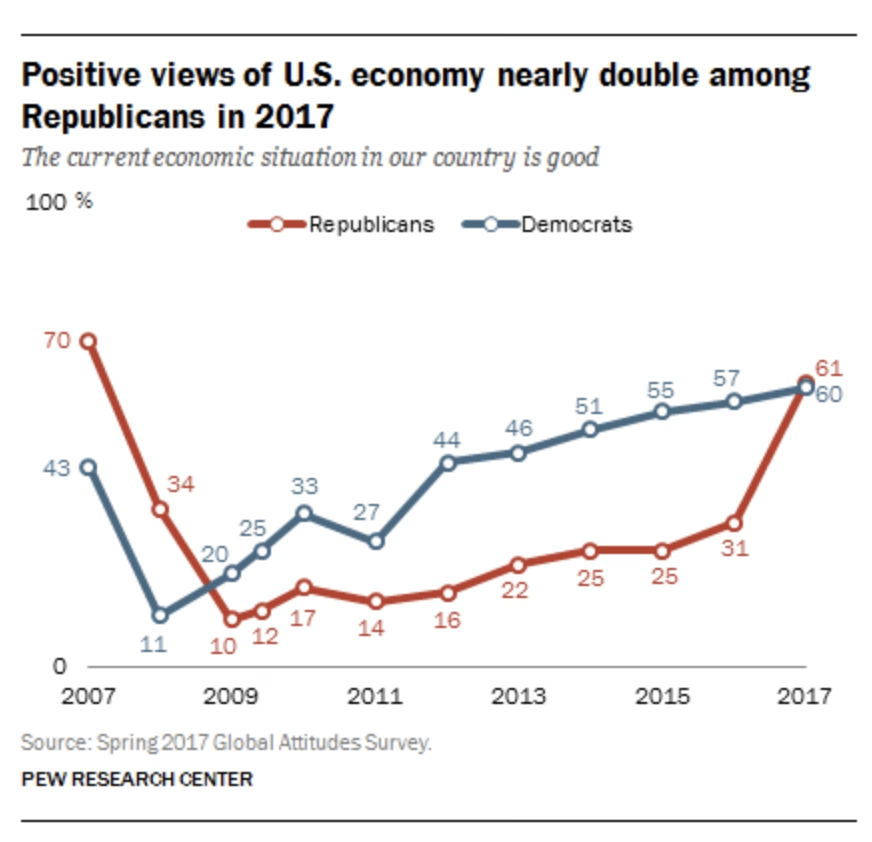
But what about wage growth? I have seen it asserted that wages grew especially well under Trump. But this graph from the Federal Reserve Bank of Atlanta suggests that during the Trump administration, the trend was relatively flat, if slightly up in the later years. But the fluctuations were in a range that existed pre-Trump. And, of course, along with inflation, wages are up under Biden.
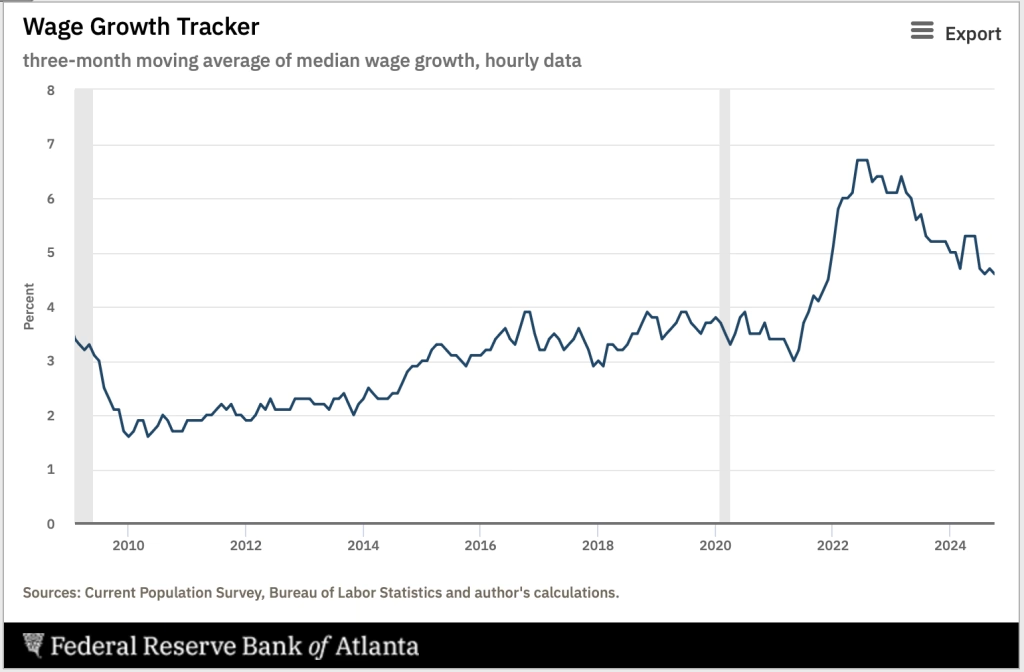
Here’s a similar graph from the Economic Policy Institute.
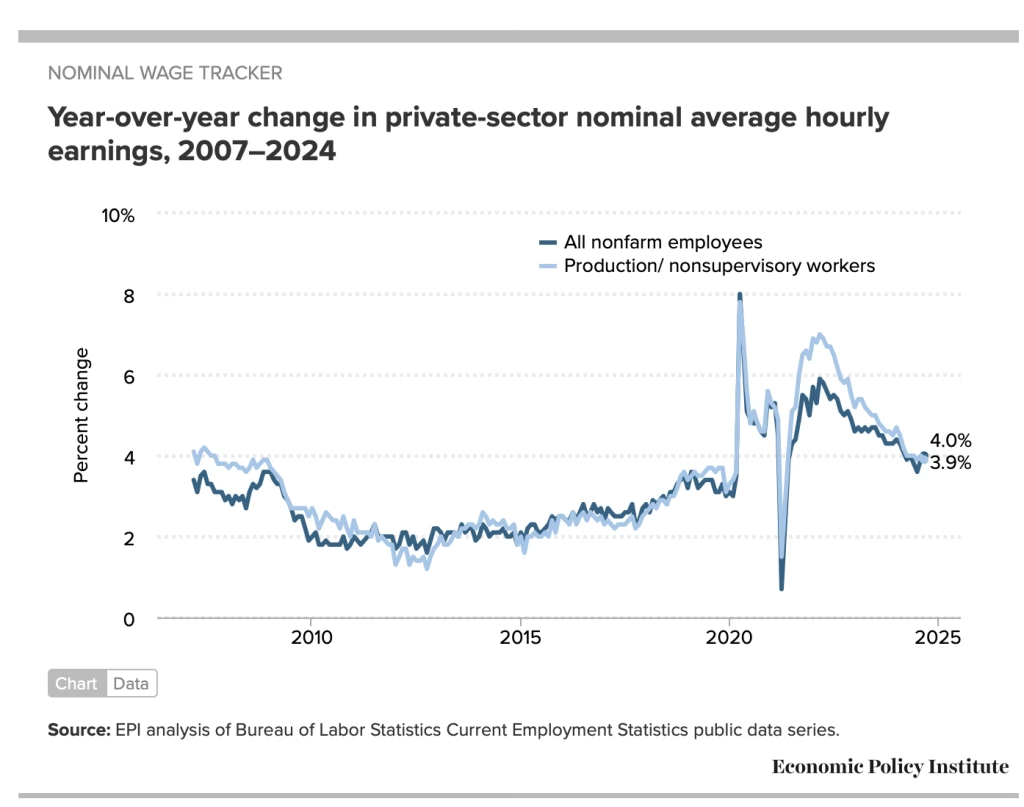
More wages from the Federal Reserve of St. Louis.
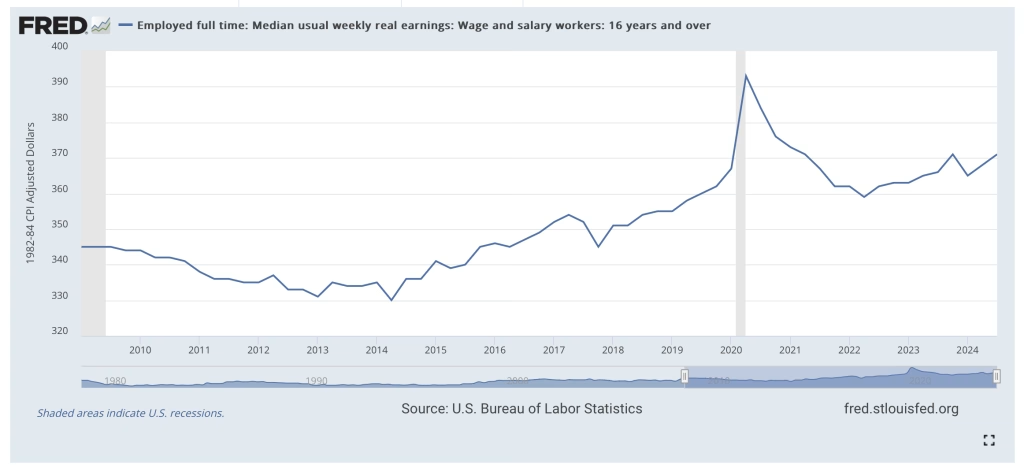
All combined you can see some improvement in Trump1 better than Obama2. But it is nothing dramatic. Certainly not enough to declare it some special period of wage growth. And, again, there has been substantially more wage growth under Biden.
See, also, CAP: Americans’ Wages Are Higher Than They Have Ever Been, and Employment Is Near Its All-Time High. The piece has a number of additional charts and graphs. I will share just this one, which is toggle to show the post January 2021 period.
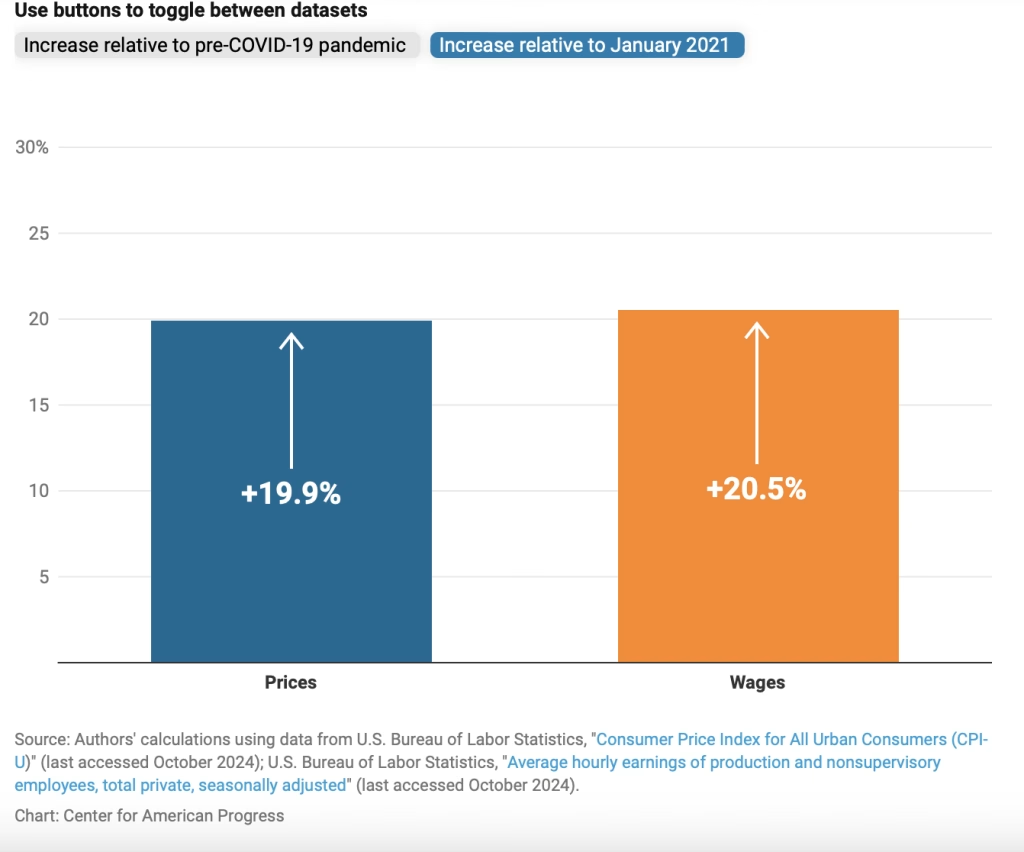
Here is the annual GDP from 2008-2023 (World Bank).
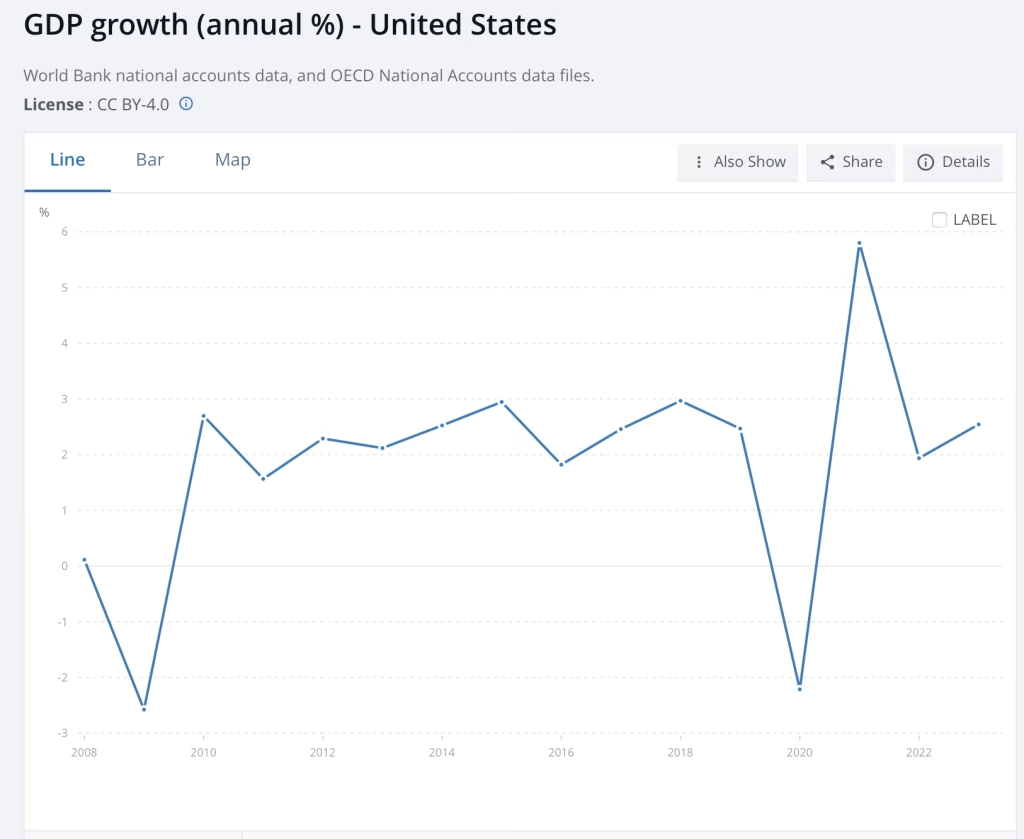
To return to unemployment, note the trend line from Obama2 into Trump1.
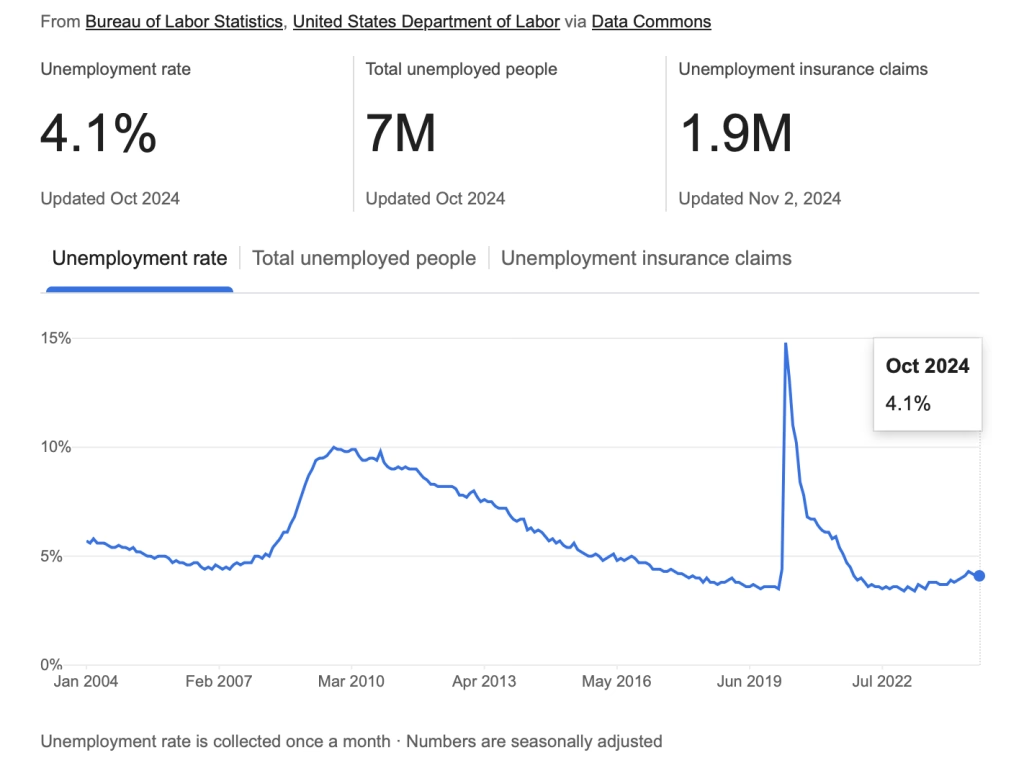
For kicks, here’s the DJIA over time. At a minimum, it is hard to say that stocks suffered under Biden.
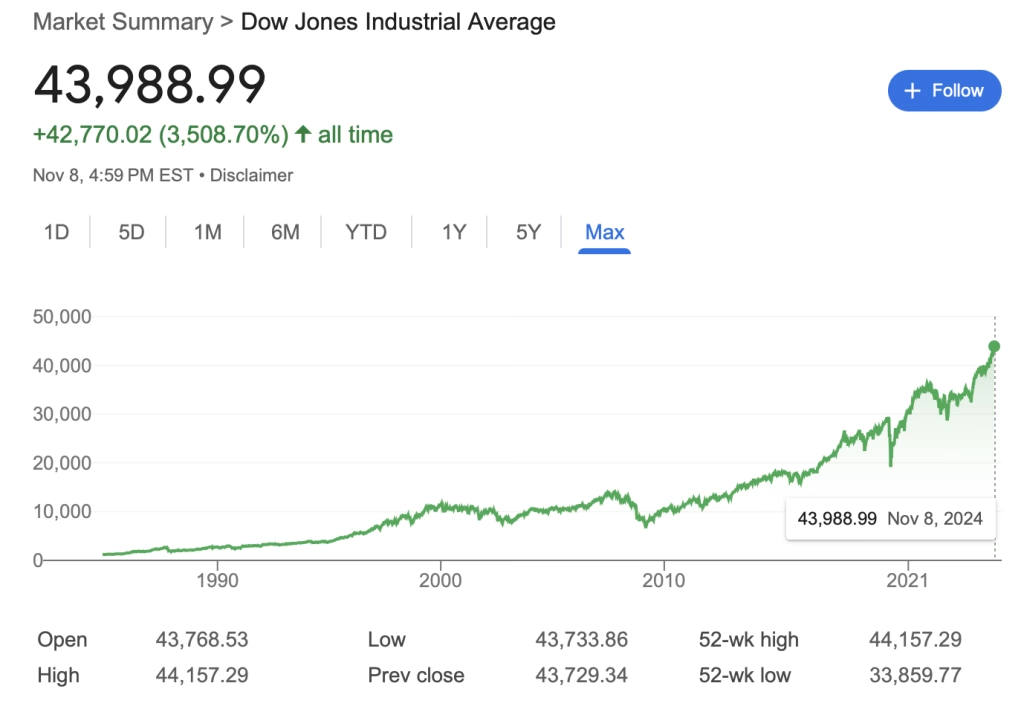
Also, here are gas prices (source: Department of Energy). The blue line was the nominal price and the yellow is in constant dollars. Of the things to note include that the basic gas or price during the Trump administration pre-Covid started, you guesed it! during Obama2. And, of course, the low point was during the pandemic.
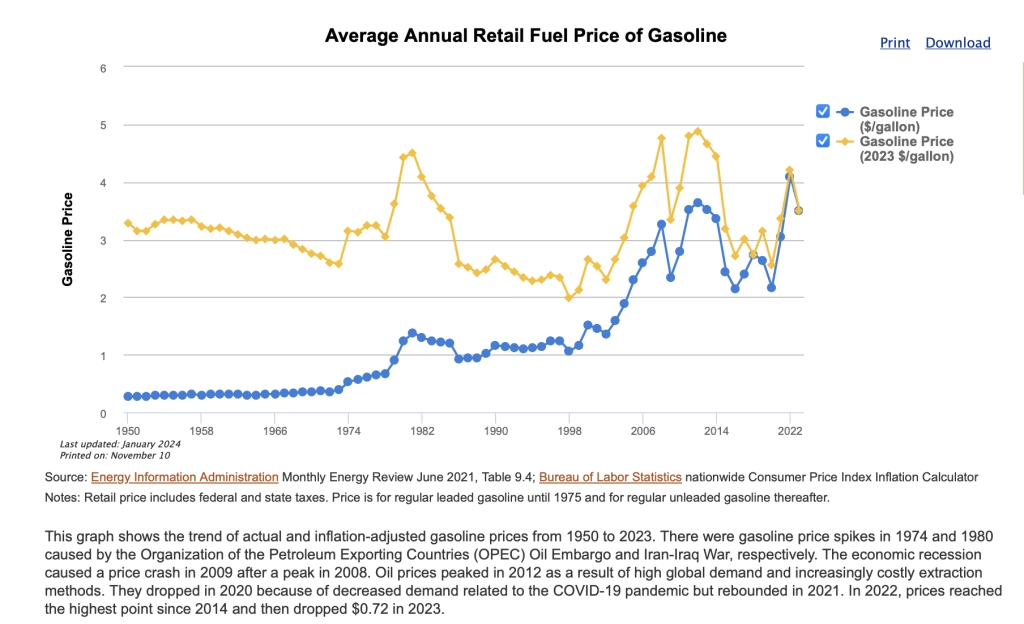
As usual, we find out out that adjusted for inflation, gas isn’t even at an all-time high. Of course, I know it is impossible to get the general public to thinking those terms.
Here are the monthly numbers from 2013 to now (unadjusted), which really underscore the pandemic issue.
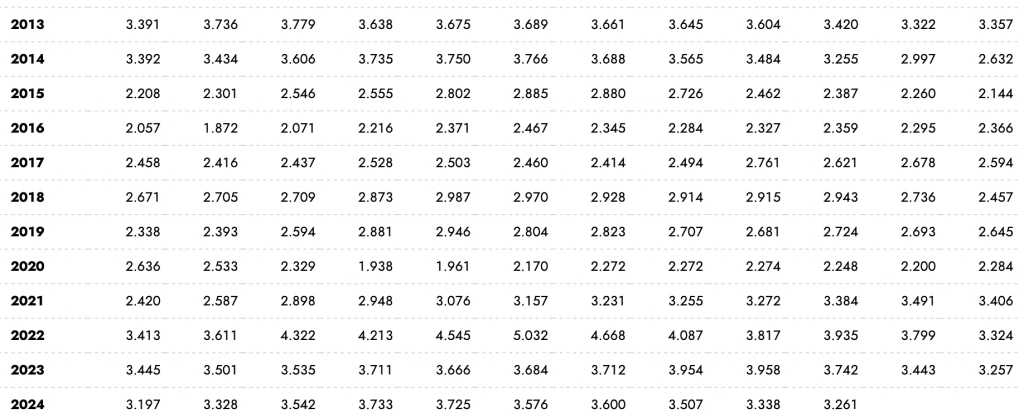
If you look at April and May of 2020, during the height of the lockdown, gas was under $2/gallon. Spoiler alert: barring another global economic catastrophe, those numbers aren’t coming back.
But if you want to play silly games, gas was cheaper during most of 2016 than it was during 2017. Was that because Obama was some kind of economic genius? Or might it have something to do with the global market for oil? Indeed, I see that in January of 2016, it was sub-$2/gallon!
So, what’t my point?
One, here are a lot of details. This isn’t just vibes, headlines, or op/eds. Indeed, this hits the whole “news bubble” discussion in its own special way: it is just data.* (That is, most people rely on others to provide the data and the interpretation). I don’t see, in the data, anything that was spectacular about the Trump1 economy in his first three years that justifies an empirical argument about its superiority. I definitely don’t see anything in the numbers to justify voters ignoring things like January 6th, not to mention a host of other issues in asserting how great his administration was.
Two, I do understand how inflation rates, and the pandemic in general, generates nostalgia.
There is a difference between an evidence-based argument and nostalgia.
At this point, there is no doubt in my mind that a major explanation for Trump’s success at the ballot box is inflation-driven anti-incumbency. So, I am clearly not arguing that economics don’t matter. I will note, however, that prices aren’t coming down because he was elected.
Three, wages are also up. And I don’t see how saying the wages were up under Trump is a persuasive comparison.
Look, I fully understand the election is done. Further, I am open to a reasoned, evidence-based argument over what I am missing. But at the end of the day, I do not see evidence that the Trump economy was some Nirvana worth returning to (nor that it was unique). And that is separate from the question of what policies supposedly created the alleged Nirvana in the first place.
I certainly see nothing from the past that indicates he will do anything special to make the economy better. Either he will do a lot less of what he has promised, and will coast on what he inherited. Or if he does what he promises, wreck what was handed to him (especially tariffs and mass deportations).
On the margins, tax cuts for corporations and cutting regulations may enhance profits and keep the DJIA churning upward (note, however, it is at a record level now, so it isn’t like these things are stagnant). However, history has demonstrated that such outcomes don’t trickle down as promised.
I do not expect gas prices to deviate significantly from where they are. Oil production in the US is already at an all-time high. We are the
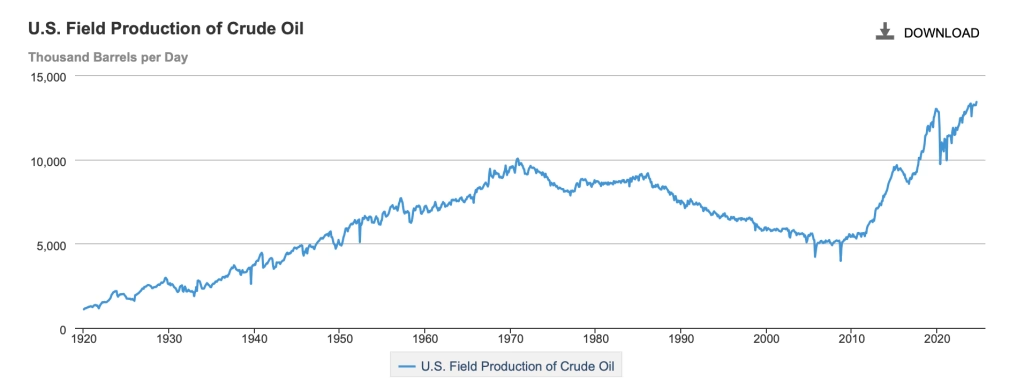
Indeed, United States produces more crude oil than any country, ever.
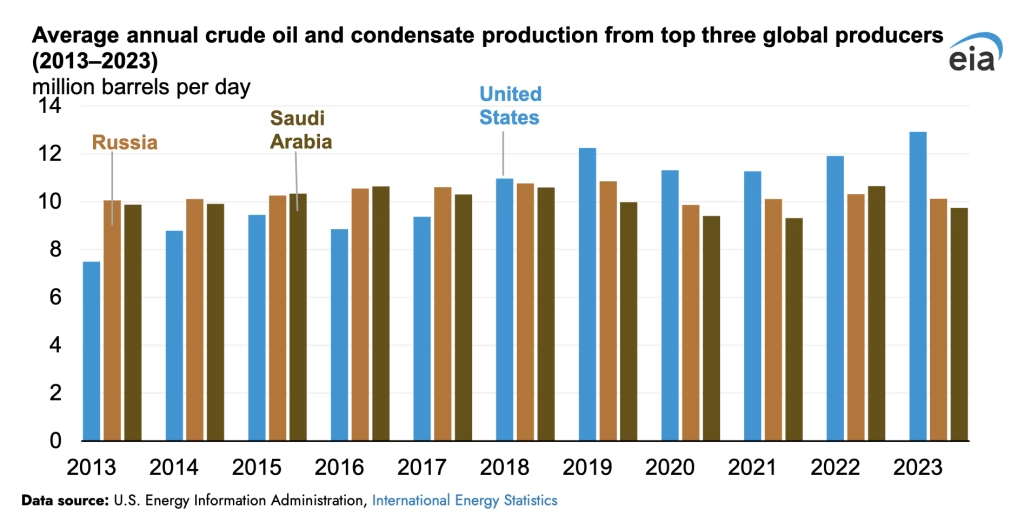
Ok, that’s enough!
I will conclude as follows. I am not arguing that the Trump economy pre-Covid was bad. I agree that it was basically good. But it was of a piece with the Obama second term economy. It was not extraordinary. It was relatively normal. And while I understand the power of nostalgia, the data doesn’t back up the notion that it was anything other than as described.
Inflation is the one difference (but, again, the inflation numbers predate Trump). So while I see how that clearly affected the electoral outcome, no one can argue that Trump can return prices to where they were. And, note that the inflation rate is already back to acceptable levels, so he inherited that.
*BTW, I know that CAP is left-leaning. But the issue for anyone who wants to use that position to dismiss the data, you have to tell me why the data are wrong.
Long-term, I’m actually concerned about inflation inevitably resulting from Trump’s and the GOP’s policies which favor market overstimulation. In other words, pushing short-term gains. If we’re going to deficit spend, at least support things that yield longer returns like infrastructure, research and education.
What is likely to happen is what we’ve seen in the past… GOP tanking the economy after several years of bad economic balance followed with a purge and clean up by a Democrat administration.
Yes, the “Trump Economy” pre-COVID was really the Obama third term economy. And yes, U.S. economic performance under Biden was, per the very conservative Economist, the envy of the world. But nobody knew.
WAPO, NYT, et al seemed to start reporting some of this a month or two ago. The electorate is a box of rocks prone to cum hoc, ergo propter hoc but the supposedly liberal MSM didn’t help much. Trump liked to put the press in a corral at the back of his rallies and make fun of them. If that’s what now happens outside his rallies, they deserve it.
I have made the same argument you are making. Virtually every economic number while Biden has been in office has been good, often better than Trump’s numbers. Trump promised jobs would return but Biden delivered. What I think I have learned is that it didnt matter because inflation tops everything else. You can tell people the entire first world had inflation and it was less and resolve din the US faster than anywhere else but it doesnt matter. Most people dont look at numbers. Those that do often do it superficially and without nuance or just believe the numbers their tribe provides.
What I fully expect is that without the numbers changing much Trump will announce he has cured the economy and his followers will believe him.
Steve
I appreciate the effort, but I think you have embarked on a massive exculpatory effort in one of the most difficult policy areas there is: economics. The economy is fluid, intertwined and difficult to measure, and has multiple facets. In broad strokes, Trump’s term finished in an exogenous crisis. I criticize him for listening to the Faucis of the world. Biden’s economy was characterized by a rebound from the crisis, and the massive stimulus thrown at it. His statistics are not of his making.
In the real world, people look at two things: 1) job security/mobility and 2) the nexus of inflation (buying power) and real wages. Trump’s economy was good. Biden’s was not. You really don’t need to construct a Rube Goldberg dissertation. The people dont read FRED (I do) but they know what they feel. And the people have spoken. You can try to explain it away, but it didn’t, and I don’t think it will, work. With respect to capital, capital looks at return expectations. We need a friendly environment; capital moves at a lightening pace. I doubt he will be hostile.
My view going forward is simple. It appears he will have the House, the Senate and the White House. So now? Perform. Its on him now. I believe he inherits a rather weak economy, characterized by a weak reed of employment growth, mostly low wage, government and part time. I would suggest to you that his immediate instinct, lower the cost of energy, will provide a positive jolt to the economy as energy is so intensive in the US. Repatriating manufacturing will be a slog. The debt overhang is very vexing, but it appears the interest rate environment is not going to get to Paul Volker levels. I hope he lightens the regulatory burden to spur development.
The thing about the economy is that it moves fast. Only time will tell, but in 1 year we will know where things are going.
@Jack: I don’t disagree with the general tenor of your comment (at least in terms of the complexity of the economy and the degree to which common citizens don’t pay attention to stats–but I noted that in the post).
But you are eliding a claim that you yourself made: that the pre-Covid Trump economy was a good reason to vote for him.
I do question your assertion the Trump has inherited a weak economy. What is your evidence for that assertion? Because that isn’t what the numbers indicate.
@Jack:
Apart from instinct, how do you think he can accomplish this?
Even if we assume that he increases access to federal lands, how much more capacity does the industry have to extract more oil?
@Steven L. Taylor: This statement caught my eye as well.
We have a very energy-intensive economy, and it’s getting more so. AI alone has enormous energy demands, and growth in this area means it needs to be considered if not addressed outright. But our ability to rapidly scale up energy production is hemmed in by a number of things: one, our transmission infrastructure is in awful shape. Two, the decommissioning of coal and nuclear plants means that those are not an option; even if they were to be put back on the board, approvals for these facilities take decades, not years. Three, Trump’s opinions on alternative energy sources are well-known–those do not appear to be part of the solution. Even natural gas and hydrogen are limited by available pipelines.
Lowering the cost of energy means more than opening up ANWR.
@Jack:
A point I’ve made myself from time to time, but perception makes the assertion arguable.
I, on the other hand, would suggest that Trump’s immediate instincts are targeted only toward self-gratification and that lowering the cost of energy is outside the scope of government, unless you’re suggesting nationalization. Are you?
Repatriating industrial production may also be outside the scope of capitalist/corporatist government, but if you have ideas for how to go about it–beyond “is a slog” I’m sure everyone would be interested.
The new Jack, writing multiple paragraph posts with decently formed ideas, is a nice addition to the community so far.
@Steven L. Taylor:
Given what I do for a living, I will suggest to you that things will happen far faster than you suspect. “Things take time” is rarely an impediment when investment opportunities present.
Executive orders to eliminate bottlenecks can be almost instantaneous. If you are talking about erection of plants and distribution, then yes, that will have a lead time. But don’t discount the effect of market signaling. More powerful than you may believe. I’m more concerned about the artificial demand of filling a 50% depleted SPR than anything. Thanks, Joe, for your recklessness.
I didn’t bring this up in the previous comment, but people don’t want to admit that the bills (eg the outrageously labeled “Inflation Reduction Act”) were just massive spending bills. We got inflation. But if you read the Fed reports, as I do, you will see that the gig is almost up. People have shot their wad. Trump may need to worry more about recession than inflation. Thanks, Joe.
As I said, I think Trump has been dealt a weak economic hand. But again, doing what I do, I will not be surprised if America unleashed does quite a nice job of recovering. The real question, IMHO, is whether we have an economy that shifts more towards value added goods and services, and less low value services in government, hospitality and a bloated health care services sector.
Shorter: we need to make things.
As a Texan, I don’t see the production of oil (or gas) increasing unless there is an increase in the price of commodities. Natural gas is near its low and has been. The price per barrel of oil has been hovering around $70/barrel which apparently is near the price of production. The industry is not going to invest in much drilling and production at those prices. The petroleum industry is rapidly consolidating to create economies of scale in the current existing production of oil and gas. But not in the drilling for new sources.
@just nutha:
Agreed.
@Jack:
You keep citing this, would you mind elaborating?
You have to admit, that’s kind of big deal if we are really talking about increased production in a way that will substantially change consumer prices.
I, mean, sure, there are executive actions he can take, but you have to admit that, in and of itself, does not mean more actual supply.
I have attempted to show my work on this. Care to reciprocate?
1. Why do “think Trump has been dealt a weak economic hand”?
2. What does “America unleashed” mean?
@Jack:
I think it’s definitely fair to say the economy that Trump is inheriting this time is definitely weaker than in 2017.
I am less confident than you that increased energy production will be the shot in the arm you are hoping for. Or rather that it will be enough to offset the impact of Trump moving forward on increasing tariffs.
The other big question is the impact of his deportation plans on agriculture, meat processing, food preparation, and other low wage industries.
Again, I agree “we need to make things” but you also note that “repatriating manufacturing will be a slog.” Whether it’s true repatriation or building new (or updating existing shittered) manufacturing facilities, that’s not something that happens in the first 100 days (or even the first year). BTW, construction is one of those other areas where deportations could have an net negative impact for a while.
I think the big question is, if the Trump approach works, when would consumers see a real price impact. If there isn’t significant improvement–higher wages and lower prices–by Spring of 2026 (1.5ish years), the mid terms could be really ugly.
And if going into 2028 that hasn’t happened, it sets up the fourth election cycle where control of the WH will probably flip parties.
@Steven L. Taylor:
Go screw yourselves. C’mon now. C’mon. It’s a joke. Have a sense of humor. ;->
@Steven L. Taylor:
I’m in the investment business. For 35 years I’ve made and experienced the results of capital investment. It’s brutal. You perform, or your limited partners fire you. I can’t afford to engage in politically motivated comments or decisions without attachment to economic reality.
Trump has been dealt a weak hand because the employment stats are constantly revised down, are in reality tepid, and the composition suboptimal. People tapped. Look at FRED on consumer debt.
America unleashed means that an economic environment that doesn’t regulate and threaten taxation will, of its own strength, prosper. We have tremendous resources.
@Matt Bernius:
Matt
I think you underestimate energy.
On tariffs. I am uncertain. But mercantilist policies by the Chinas of the world cannot continue. I’m a good University of Chicago free trader. But you have to have free trade. Comparative advantage is an academic concept. Real world is different.
On ag. I know. This becomes a value judgment. Should US consumers take advantage of lower prices at the expense of the destruction of the low skilled wage structure of other US citizens? Why arentbUS citizens taking these jobs. Because they have income support? Is that right?
@Jack: I have a hard time characterizing the COVID pandemic as a completely “exogenous crisis.” Just as was the case with the influenza pandemic of the early 20th century, it matters greatly how the federal government handles that challenge. We can get into the specifics of how Trump mismanaged the federal government’s response if you want, but it wasn’t good. (And please don’t jump on the scientists for making adjustments to their recommendations, based on new information, or new takes on that information. That’s how science works, as opposed to, say, telling people there wasn’t a pandemic coming, or resisting more testing.) Trump’s actions had consequences, not just measured in a million plus people dead, but also because of the economic impact.
All of which makes me concerned about Trump’s handling of the next “exogenous” crisis, and his ability to prevent it from happening. China invading Taiwan would trigger an economic earthquake because of the importance of microchip manufacturing on that island. But the invasion wouldn’t happen in a vacuum. Trump cutting off support to Ukraine would certainly cause the regime in Beijing to wonder about how willing he’d be to defend Taiwan.
Trump did little his first term to advance the economy. He passed a massive tax cut bill and implemented tariffs. Signed the CARES bill. What else was there? He benefitted from a weak Fed that kept it’s zirp policies in place and only incrementally raised rates near the end of his term, still far below historical averages. He ballooned the deficit even prior to COVID. The return on investment was weak at best. He characterized his economy as the bestin American history…it was average at best, even with favorable fed reserve
@Jack: FWIW, I sincerely appreciate your engagement.
@Kingdaddy:
Kingdaddy
Actually, the standard model for dealing with pandemics is immediate and total isolation. To hive off vector spread. That’s the science. Period, full stop.
The problem is that no society would tolerate it, and it presumes no costs to that approach. That’s the reality, and politics.
A strategy that no society will follow is not a strategy. Its an aspiration. The rest is fluff. But argue away about details……….
“What does “America unleashed” mean?”
I was wondering that myself. Personally, I think it’s econobabblejargoncrap but am open to having my mind changed.
“America unleashed means that an economic environment that doesn’t regulate and threaten taxation will, of its own strength, prosper. We have tremendous resources.”
That sounds more like an article of Objectivist faith than a plan, but I’ll accept it as a sincere declaration while noting the details are still pending.
@Steven L. Taylor:
Well, thank you. Its the same me. But its refreshing to not make a comment and have 10,000 arrows come flying my way.
I sit on our investment committee. This place is tame, comparatively. I confess to emotion, hyperbole, sarcasm, and vigorous disagreement. Sneering? Hmmm. But as I have noted, I don’t come here because of a gun held to my head.
I try. I’ll give you an example. This guy Michael Reynolds can be a real horses arse. But I read his comment on one of these threads today and thought he hit the nail on the head. Best comment of the thread. And I said so. I have no doubt he will be calling me an a-hole in the next few days. But I call as I see it. Its not personal.
@just nutha:
It means allowing the private sector to function in a relatively unfettered fashion. Not command and control by government.
The empirical evidence is clear, globally, the former beats the latter.
Its not rocket science.
@Jack<:
Actually I think that’s incorrect. IIRC, skilled agricultural workers make $15-20/hr. Not a living wage unless your employer throws in a trailer for you and your family to live in while you’re picking his crop. And how long take to acquire the skills?
How many Americans are willing to live as migrant workers? I suspect given Trump’s and Musk’s statements, the answer may be all too clear all too soon.
I have the problem as US workers being disinclined to work at jobs where it is necessary to continually relocate as they follow the harvest. Things may have changed in agriculture since the days when I was signing Hispanic students out of the district a month or so after the year started because the family was moving to a different state to work a different crop.
@Jack:
But Communism, like unfettered Capitalism, relies on the better nature of humans. So far, I’m not seeing wide distribution of Homo Sapiens 2.1 in the wild.
Even Adam Smith in the Wealth of Nations understood that unfettered capitalism wasn’t utolia.
Motors need regulation of some sort to avoid runaway self-destruction. IMO, capitalism is no different.
But as always,, YMMV. And a belated thanks for contributing today. You’ve given me food for thought
I was just reviewing the thread. I think I left a point unaddressed.
I’m not saying Trump can simply wave a wand and make energy capacity appear. But make no mistake. And I think people not in the investment business fail to see. If they believe the environment for capex in energy is positive, and not this EV, niche wind and solar crappola is in favor they will invest. They will. And markets look forward. So much capital investment. And not down the drain solar and wind.
@Jack:
I still haven’t seen an answer to the question on HOW Trump will lower energy costs.
The experts (that presumably your investment committee considers), have said that ANWAR crude will not hit the market until 2031. Even if all the regulations were suspended, construction of the infrastructure will delay actual production. Oil producers are (reasonably) reluctant to invest in new facilities with current crude barrel prices.
Trump’s energy policy appears to be drill, drill,drill.
Does he have some other plan to reduce retail price of gasoline to say 1.40/gal in the next several months?
Do tell so we can get behind and support the secret plan.
@Bobert:
I’m guessing nationalization.
@Bobert:
I used to work in the industry, seven years is about right from awarding a lease to bringing the first wells into production, and it has nothing to do with regulations, permits etc.
It just takes a lot of time to explore and locate potential structures, do seismic or whatever to define the subsurface geology/formations, drill test wells to see if the structures you hope have oil really have it – after that you can build the supporting infrastructure for your producing wells. But, if we are talking arctic, you probably need longer because of the difficult environment.
@charontwo:
7 years, OK.
So lets see how the Trump administration is going to “deliver” retail gasoline at 1.40/gal in the next six months?
@Jack:
Trump will remove sanctions on Russia, more oil will move into the market, which will lower prices. Even with Russia forced to sell steeply discounted energy, prices are fairly low.
As for all those namby pamby green energy sources you dismiss, about a quarter of Europe’s power is from renewables. Thank goodness because without Russian gas they would have been in much deeper trouble. Right? As solar panel and battery technology improves, and costs drop, solar becomes a better and better deal. Photovoltaic prices have fallen by 90% on the last decade, ditto batteries. IOW, solar, while not only better for the world, is becoming a better deal economically.
Then, there’s nuclear, which the tech boys want ramped up quick to handle AI and crypto.
So, we have solar and wind becoming cheaper and more efficient, a resurgence of nuclear, and the likelihood of Russian oil and gas flooding the market as soon as Trump bends over for Vlad. And you think the smart money is going to be in drilling for oil that won’t hit the market for five years?
No, I think the real play is to use government to manipulate the market by slapping crippling sanctions on Chinese solar panels and e-cars. That would make drilling a better bet, while also delaying BYD’s annihilation of Tesla’s dated cars. Add in a US retreat from the ME which would make ME oil harder to ship and more expensive. Not so much Chicago School libertarianism as corrupt cronyism. I assume you’re heavily invested in stocks likely to profit from tariffs?
Maybe he has a deal with Putin where Russia will ramp up production and push OPEC to do the same to lower prices in exchange for Ukraine to be abandoned by US. Regardless OPEC has their price targets and if we produce more they will produce less. Gas ain’t nosediving unless there is a recession. Trump will hope that occurs sooner than later so it can be pinned to the prior administration.
@Jack:
Now we see where your motivations lie, helps to explain some of your statements.
@Jack:
New sources are not the answer in the foreseeable future, as explained by @Scott. Oil producers have plenty of capacity in reserve and make production decisions based on demand and price conditions, along with their economic analyses to invest in infrastructure and equipment to tap and extend reach within existing recoverable reservoirs using available drilling technology.
The Inflation Reduction Act’s name may not reflect its content, as it addresses a range of investment including in clean energy and energy security, but it is also not ironically named as you indicate. Approval of the IRA and the CHIPS act in August 2022 happened to coincide with the downward trend in inflation that reached a relatively low level just 9 months later. You are correct that we need to make things, and IRA and CHIPS are designed to enable exactly that. So, without a hint of irony, thanks, Joe.
A question for anyone promoting the government’s role in expansion of fossil fuel usage, but not in the promotion of clean (low/no carbon) energy technology, production and transmission: Do you accept that fossil fuel usage is responsible for atmospheric carbon levels that will result in profound and harmful global temperature increases and climate change within just a few generations?
I didn’t see a discussion of interest rates, which are definitely an issue for anyone not financially set and limited by the loan payment they can afford for a house or car. There will always be those with less-than-good credit who may need to work their way up through one or more used cars as they save money and improve their Fico. But really, isn’t that the way it’s supposed to be and the way most of us did it before we could afford to take out a loan for a new car? Interest rates are higher than they used to be but going down–just not as fast as borrowers would like because consumer interest rate reductions are market driven quantities that are both priced in prior to announced Fed rate reductions and continue to lag after Fed rate reductions. So interest rates are higher than before, but are not that high. And the “before” in this case is post the great recession and the Covid recession, so let’s not hope for a return to near zero Fed funds rates and the accompanying lower (but nowhere near zero) consumer interest rates. The F&FG tried to browbeat a politically motivated Fed rate reduction in his first term, and will no doubt try it again, but hopefully the Fed can maintain enough independence to stay isolated from shortsighted political demands.
@Eusebio: I’ve been pointing to interest rates as a big factor of the feeling that the “economy isn’t doing well” even though it’s been recovering for a while now. For people who don’t pay off their credit cards, interest rates are a big deal. The NY Fed does a report on household debt and that has continued to edge upwards, and was at $17.8T in Q2.
““America unleashed means that an economic environment that doesn’t regulate and threaten taxation will, of its own strength, prosper. We have tremendous resources.””
Note that that’s *not* what Trump is about, nor the GOP, nor the billionaires, nor the Chistofascist movement. They are about control and oppression and exploitation for their enemies and the weak, and special privileges for them and their friends.
In the meantime, our next President attempted to overthrow the government, and was rewarded by the bribe-taking SCOTUS with massively increased power and immunity.
We are moving very strongly and sharply *away* from free markets.
@Jen:
Credit card rates do not seem to have much connection to the discount rate or Treasury notes, they are more just whatever the banks can get away with. Bank stocks have been doing great since the election.
@Barry: Yeah, there was a lot to unpack in that statement. First and foremost, “doesn’t regulate” is carrying a lot of big assumptions. Even if the federal government decides to roll back, reduce, or eliminate much of the regulations in place surrounding the development of energy (also, a sub-point, we have yet to clearly define what we mean by “energy production”–is this just oil & gas, and so more of an extract, refine, and transport issue, or are we talking about electricity generation, which is fueled, yes, by natural gas but also by nuclear, wind, and solar?), we still have to consider state regulations.
But, those are just a small(ish) factor in the broader energy sector. Transmission, as I noted earlier, is waaaaayyyy behind. This isn’t just because of regulations. It’s also trying to determine the best route to take for high-powered lines, which gets into individual property owners’ rights, negotiating deals with them, and–potentially–starting eminent domain proceedings if needed. All of this comes with a LOT of legal work (and expense) and that’s really just the tip of the iceberg.
I find the dismissal of wind and solar kind of amusing. The number one state for wind energy is Texas, and I believe Kansas isn’t far behind. Red states have vast amounts of wind resources, and farmers have benefited greatly from land leases. Wind energy is also a very American enterprise, many components for turbines are made here in the US. So the outright dismissal of this as a contributor doesn’t square with my understanding of the energy sector. As a writer for hire with a background in the legislative process, I’ve done quite a bit of content creation for the energy industry (all forms, including fossil fuel). I’m not an expert by any stretch, but I have had to learn quite a bit.
@charontwo:
Yes, I know…which in some cases is bordering on 20%. If you don’t pay your cards off every month and see your interest rates rise, you’ll start to feel like you’re drowning pretty quickly. Card issuers use all kinds of formulas, but typically there’s some connection to your credit score and payment history, which will start to decline as your balances rise, which can be impacted by availability of credit, etc. If your groceries cost more, and you adjust for that by paying less on your cards, the card balances balloon…and so on.
@Jack:
I might. To your point it’s considered at least 9% of the CPI. I also remain skeptical we are going to see a drop that matches the artificial lows of the early COVID era. So that puts a target of approximately $2.6 a gallon (the average for 2019 . According to AAA we’re around $3.08. So granted we’re close to dropping under $3 and that could be a huge psychological win. But I am unconvinced of how low it can go under the current broader economic moment.
As to the rest:
First thanks for confirming who you are, my fellow Maroon. However, I think the uncertainty you express is really telling. You know how many basic consumer good are being produced in the “Chinas of the world.” I also expect you know how few competing price-category products are being produced in the US. And it’s also worth noting that at least in his rhetoric, Trump’s tarriff’s are “across the board” versus targeting the China’s of the world.
If everything from food items, to household appliances, to electronics prices go up… I’m not sure a drop in gas prices will ease that pain.
Suddenly you begin to talk about “values”? I thought they didn’t matter and that policy remains supreme in the views you expressed preelection. Or perhaps you see that as different than morality.
Either way, I appreciate that you are tacitly agreeing that this will most likely impact Trump’s lower income voters. Additionally, reading the unsaid in “Why arent US citizens taking these jobs. Because they have income support? Is that right?” is the necessity in your world view to significantly reduce the social safety net to incentivize people to take those low income jobs. That’s before we get to the necessity for constant migration to do many forms of the work year round–which itself is a huge barrier.
I am not sure that reducing the social safety net while increasing consumer prices in many areas is going to be the formula for winning–especially as I note what we have experienced in the last two Presidential elections.
Again, it could work, but it has to do so in approximately a year and a half to maintain Republican control of Congress. And if it misses that, it needs to do so in three years to enable Republican control of the White House.
As you correctly noted throughout most of 2024, being told that “the economy is turning around” or “the fundamentals are strong” means nothing in the face of feelings–especially when your campaign rhetoric and your own words repeatedly promised, “I will bring down the cost of consumer goods AND increase wages.”
@Eusebio: I should have included interest rates, which are definitely part of the story.
@Barry: Indeed. I get, in the abstract, the notion that Republicans are low-tax and low-regulation and, ergo, good for business.
But I also think that is overly simplistic and, moreover, that Trump has not clear vision for that. And, in fact, is objectively pro-tax (tariffs).
This conversation is also somewhat ironic given all the proverbial ink being spilled about how the GOP is the pro-worker party now and the Dems are the corporate shills.
@Jen:
It feels ideological to me, TBH.
And I don’t just mean Jack, I mean that there is a clear anti-renewables position that I see a lot of Rep-leaning persons take that strikes me as irrationally derived from their political POV.
@Steven L. Taylor: Agreed that it seems ideological (and, also, not just Jack), but for me the major disconnect is that red states are the biggest beneficiaries of land-based wind power. It’s been a core contributor to overall energy production in Kansas and Texas for years. North Dakota has the highest generation per capita. Iowa and Oklahoma are big producers as well. Remove wind power from the generation of any of these states and they’d be furious.
@Matt Bernius:
I’ve mentioned elsewhere a target of ~1.40/gal. I based that on Trump’s promised 40% drop and current prices (my area of 2.50/gal). That’s what the voters heard and what they are paying currently. They did not hear anything about averages
@Michael Reynolds:
Let’s level set this. I have no inherent objection to the concept of alternatives. Why would I? But as a practical person, I know solar and wind will be niche sources for quite some time. And I’m talking 50 years.
To note that technology progresses is to note the obvious. But that is simply a concept. Think operationally: how fast? And I will tell you that with the energy demand of AI coming down the line like a freight train I simply don’t see solar plus wind outpacing it in even the most opium den fueled dreams.
I’ve told this story many times. For probably 20 years now, and every few years, there is a wave of investment opportunities in solar and wind. Ground floor. Two to three years later, when most of these companies have gone bankrupt, comes the next round of teasers. “Rescue capital needed!! You, too, can invest in solar (or wind) for the low, low price of $$.” These technologies are simply not economic at the present time. They may be in the future. But not now. And can I direct your attention to the car companies who have throttled back their EV plans? With billions written off?
“And you think the smart money is going to be in drilling for oil that won’t hit the market for five years?”
So yes, I do. And it will be more like 2,3.
We haven’t touched nuclear. Its always a tipoff that energy solutions of zealots mostly rely on deindustrialization, taxes, and niche approaches. Give me a full throated endorsement of nuclear and you will get my attention. Else, I know you don’t really care about your neighbor’s job, national security or the environment. Moving coal production to China doesn’t do squat for climate.
@Matt Bernius:
Kinda weak, Matt. Look, we deindustrialized. Getting back is going to have costs. Better to get going. Dr Taylor noted that tariffs are taxes. True enough. But our policy of offshoring has been one of subsidy. Its the flip side.
Can we be a society of people cutting each other’s hair? Or, egad, financial services? Further, don’t we have strategic interests in retaining certain raw materials production and manufacturing capabilities? Again. Free trade is academically pure. Mercantilism with your enemies is suicide.
@Jack: “Given what I do for a living, I will suggest to you that things will happen far faster than you suspect. ”
I believe you. Because I know from experience that round about January 22 Trump will look at exactly the same economic circumstances we’re in right now and declare it the best economy in human history, insist it’s all because of him… and you and other MAGAs will flood social media with that.
I saw some speculation in comments that opposition to alternatives is ideological. Nope. This is one of the things I find frustrating about left thinking on a blogsite like this. “It can’t be practical, from an engineering or investment perspective, it must be Republicanism.”
No. Just no. Read my comment to Reynolds. These technologies are just fine, but have limits and costs. The major car companies have just gone through massive (losses) and recalculation of their EV goals because their economic fever dreams, and political expediency, met with reality.
Some day we may – may – have a much less fossil fuel oriented world. I don’t think anyone posting on this blog will be alive then. And guess what, the planet will be just fine anyway.
@wr:
I have taken Dr Taylor’s admonitions to heart. Trying to be patient with people. But do you realize that comment makes you look childish?
@Flat Earth Luddite:
Communism is dictatorial. Free market capitalism relies on a tension between opposing, admittedly self serving, goals. Read that carefully: self serving.
Its a crappy system, but the world is not inhabited by angels. Its the worst system, except for all the rest. The role of government should not be to pick winners and losers, but to prevent monopoly or intrusion of ones rights just because another party can.
@Jack:
What part? If you are going to call an argument weak, you need to point out the weaknesses.
See this is always where things go off the rails with you. When you get to a point where you don’t want to acknowledge the weakness or contradiction within your position, you resort to these broad statements.
We can’t have a discussion if you’re unwilling to cede any ground on your positions.
Correct. There’s nothing here I disagree with. There are going to be costs. Just as there were to Biden’s policies. And just as you did with Biden’s policies, we need to talk about impact over time.
Also it’s great to hear you finally publically acknowledge that tariffs are taxes. That’s something I have never heard you do before. It’s also in stark contrast with the rhetoric we have heard from Trump, Vance, and the rest of the campaign.
Since we all agree that tariff’s are taxes and will be paid by American consumers, then we should talk about their potential impacts. You were the one who said we need to engage with the “real world.”
And we should also do so in the wake of the promises that Trump made (i.e. he will bring prices down).
There is a certain irony hearing this from an investment banker, but I appreciate that ultimately you can point the need to invest in manufacturing.
BTW, you have never mentioned what your areas of specialization/verticals are in investment banking. In the past you seemed to indicate that you had done work in the RV space manufacturing space. Just curious as I know from my past that most folks in your line of work tend to have specific verticals they work in.
I’m not sure where I was arguing for unfettered free trade. The point that I will once again raise is that enacting across the board tariffs, mass deportations, etc are going to have impacts on consumer prices and availability of goods. You seem to be agreeing with me. Unless I’m wrong.
You also appear to believe, like Elon Musk, that any disruption caused by this (be they market or for the CPI) are going to be short lived. That could be right, it might wrong.
What I haven’t heard you, or Elon, or anyone who is supporting the Trump plan say is what “short lived” means. So I’m curious if you are willing to talk about the time horizon you are thinking of.
And, also, what do you think will happen to the Trump administration if those disruptions are not short term–especially in the context that he never promised those disruptions.
@Jack: Reynolds is entertaining. I appreciate him the most even in the most violent disagreement.
I see we are in essentially the same business except I am not USA (and nowadays principally RE).
@charontwo:
They are related to their default rates. You are subsidizing the defaulters. If you don’t like high card rates, pay off every month. I haven’t carried a balance in 35 years.
@Jack:
Mine’s a half-throated endorsement–I 100% agree that nuclear needs to be on the table. It’s emissions-free generation and is on-demand power, addressing two of the big negatives of fossil fuels and wind/solar. But waste disposal, community push back, and siting/construction are all big BIG issues.
Community push back is actually one of the biggest risks no matter which type of energy we’re discussing. It’s NIMBY on steroids. There have been solar farms killed by local opposition, along with transmission lines (a big project, Northern Pass, got killed here in NH but not until developers spent millions trying to get it approved), wind power (particularly offshore, which is so expensive to construct), and it’s accelerated the decommissioning of coal plants. Energy companies don’t want to sink millions and millions of dollars into plans, only to face public opposition, lawsuits, and so on, costing millions more. Siting nuclear plants is challenging and expensive, and while highly optimistic estimates state a plant can be built and running in five to seven years, realistically you’re probably looking at double that (plus some).
It depends. Wind power meets about 85% of Scotland’s power demand, and on Orkney, renewables generate 110% of their power needs. Lots of wind + fewer people, it’s practical AF. (And, what does Scotland use for power when wind isn’t generating? A lot of it is nuclear.)
Now, if someone were to suggest wind generation meet the energy needs of NYC, I’d laugh. As with all things, the context and framing matters. Wind power has been THE largest generation source in Kansas for several years running.
I’m an “all of the above” energy person. There’s no way we’ll meet growing energy needs with just renewables. But I also see massive problems with the ability to meet these growing needs. Building new plants is hard and expensive. Even if you get the plants built, if you don’t have adequate transmission lines, the plant is pointless. Add to that the huge expenses incurred by power companies when a hurricane blows through and wipes out half of the infrastructure, and ratepayer revolts when they try and charge more, and I’m not entirely sure that the shackles are going to come off, no matter what happens with a few federal regs.
@Matt Bernius:
Sigh. Skip the lecture.
I’m not an investment banker. I’m a principal. I put my money where my mouth is ($200-$400K per deal; its called the “GP interest”) ; I’m not fee based; capital gains. We invest only in US manufacturers and attempt to improve them, move A to Better. We make our money on moving A to B. Our philosophical underpinning is that we think US manufacturers can do just fine if given an opportunity; we want them to stay here; we actively participate in the governance of the company to achieve A to B. The firm has done it successfully for 40 years.
You need to upgrade your negativity game.
@Jen:
I take every one of your points. And, I, too, am an “all of the above type.”
But as a recovering engineer, I have to keep my business hat on. If we want to be a serious society, we have to recognize the realities of various energy sources, and not just the political fever of the day.
@Jack:
Point of order: this is a text-based medium. So, pretty much everything most of us do here, including you, is to some degree a lecture. You might not like that, but the fact remains.
And calling out a consistent pattern of behavior isn’t a lecture. It’s naming a fact.
Cool. You’ve never gone into that level of detail. That’s super helpful and provides some additional context I’ll keep in mind.
Again great context. And that helps inform the discussion and your expertise.
And then you blow it all with the need to land an (admittedly low-energy) jab on the way out. So I’ll ask again, where’s my “out of touch” negativity?
And given your overall rehashed negativity in this thread about the current economic situation, I’m not sure you should be LECTURING (emphasis intended 😉 ) any of us.
Or at least recognized that since you aren’t getting into details of why my negativity is probably wrong, you are committing the “argument from authority” logical fallacy–using your credentials as a way to name my argument as “weak” or my need to “upgrade my negativity game” without addressing my core points about the short term impact of Trump’s promised policies on lower income Americans. BTW, I get that writing that stuff out can be challenging/frustrating/boring, so if you have links to articles that speak to your point, that would be great!
@Lounsbury:
And if I remember at least one of your verticals is the energy sector. Or was specifically the green energy sector? Is that correct?
[Update: I just realized that RE is most likely “Renewable Energy” and not a global business region that I had not heard of.]
If so, I’d love your take on this assessment (as these discussions are way outside of my wheelhouse):
@Jen: Oil and Oil refined products have been in the top 5 exports for the last +16 years. Oil in general has been the top export since 2008…
Drilling more just means more exported..
@Matt: Indeed. But “drill baby drill” has been shorthand for attempts to reduce energy prices for years. This is exactly why I asked earlier on in the thread what we were talking about when we say “energy production”–cheaper diesel? cheaper gas? cheaper electric bills? Lumping it all together as “energy” is how people end up talking past one another, and, these segments of the sector face different challenges. So, it’s useful to know what is meant.
@Jen:
100% this.
@Lounsbury:
Reynolds is entertaining.
That is my actual job. I only recently realized the bleak truth of it. I’ve written ~150 published books, a handful of un-produced screenplays, a hundred or so restaurant and TV review columns and feature stories. There are millions of humans walking around with me in their heads, and so far none have become serial killers. That I know of. Fingers crossed.
@Matt Bernius: Green energy (i.e. anything non-carbon emitting in a direct sense) . I don’t do hydrocarbons.
yes sorry habit. (well also used to mean resource efficiency in quasi synonym which to be honest is not good practie but one falls into jargon)
I see that is Jack supra.
I am not sure to read him correctly but “downt he drain solar and wind” is simply backwards looking wrongheaded.
I move hundreds of millions of euros on a private basis for RE. It is not Lefty fashion, it is good hard economics and something that my investment world is doing for the economics, not die Grunen or the silly bollocks of the US lefty greenies (this is of course industrial scale – not the every house rooftop solar nonsense as this is indeed nonsense as the hard economics of economies of scale are not repealed just because of some Lefty fashion).
Jack seems to be of a certain “Exxon and Texas” mindset. He’s wrong and very American wrong in this – with the caveat that the Green Left concept of executing non-market Diktats – outlawing and administratively banning hydrocarbons is a bad approach as it as it has on several times over here on this side of Atlantic (yellow vests, the German boilers reaction etc)
As I have commented many times I think in the past here, there is a massive naïveté in respect to the enabling infrastructure – the Grid transmission, the streamlining of the permitting and the enablement (or in your USA land the forcing of this to happen) of intra-regional interconnexions (given the incoherences of your archaïc grid set-up that badly needs modernisation).
The Progressives in this resepct are committing the sins that Jack et Co are accusing them of – and their hatred of market mechanisms is blinding them to certian needs (cutting the deal for the energy infra building as like the permitting streamlining for all such infra and having faith in the market beating economics of scale that is emerging in utility scale RE -if it is enabled by the transmission infra) – US Conservatives seem to love nuclear – make compromises (and regardless nuclear as repalcement of carbon intensive base and frequency service is sensible if one is not an anti-growth purist)
Passing Goals and mandates and treating things as if one can issue a REg and scale infra happens…. error – already USA performs miserably in terms of infra build in international benchmarking for time and cost- unless some admission the US Conservatives have a point on thickets of regs, a fail is coming.
Let them desire building refineries, ça va – so long as the infra money and equally the streamlining occurs, the scale of RE will solve it.
(EV however … I do believe is an error, particularly before grids are heavily decarbonised. Hybrids bridging I am much more in favour of – the siee I have engagement on green transport due to Brussels bureaucracy we have to uniquely do E-v including for haulage – this is utterly nonsensicle, it is bureau -functionariate thinking)
@Michael Reynolds: you have panache, I rather enjoy it, even when you and I get heated, highly appreciated. To be honest I read for the Professors and you and Andy.
@Matt:
This! And I’m continually amazed at how the “drill baby drill” cohort keeps finessing by this point.
Maybe Jack can explain where our refinery capacity is being underused or something.
@Jen:
Another “This!” Lounsbury is noting this as a conspicuous weakness in our system, and his observation is spot on.
And it shouldn’t be an “either or” issue. I was advocating for “both and” even before solar and wind were seen as practical. Anything that expands the energy pool–but particularly cleanly–needs to be on the table. But it may not matter in a 1960s infrastructure. 🙁
EVs, as well as solar and wind energy installations are undergoing rapid sales growth worldwide. Take a step back, @Jack, from individual bankruptcies and corporate realignments in these very competitive global industries, and recognize their rapid global growth, including near-exponential growth in the plug-in vehicle market that’s made them the majority of new car sales in several European countries. It’s happening whether you like it or not, so as a country that needs to make things, the US had better exert some leadership in EVs.
EVs, as well as solar and wind energy installations are undergoing rapid sales growth worldwide. Take a step back, @Jack, from individual bankruptcies and corporate realignments in these very competitive global industries, and recognize their rapid global growth, including near-exponential growth in the plug-in vehicle market that’s made them the majority of new car sales in several European countries. It’s happening whether you like it or not, so as a country that needs to make things, the US had better exert some leadership in EVs.
@Lounsbury: in re energy it occurs to me to note
1) one must distinguish between primary and final energy (see IEA 2021 useful graphs to understand final usages https://www.iea.org/reports/key-world-energy-statistics-2021/final-consumption- ETA sorry this first one useful https://www.iea.org/reports/key-world-energy-statistics-2021/energy-efficiency#abstract – to see the non transport as part of whole versus transport to understand decarbonisation agendas for impact)
2) in re primary – generation from RE with complement non-hydrocarbon (nuclear to decarbonise base and frequency, and for non-intermittancy reserve service) for non-transport is a clear choice – RE pricing at utility scale (not retail small scale, confusion of LCOE for utility and other is an error) continues to scale downwards.
electriication of final energy usage in non-transport is 100% economic sensible as electric is almost always significantly more efficient in energy conversion – modes for heating, cooling industrial heat.
3) transport is not so clear – although probably an industrial policy error for USA to neglect EV as the Chinese are eating that lunch – but EV purism for a country of distances as USA is error – plus industrial haulage there is just not practical modes. Never mind flight.
knock down non-transport hydrocarbons for energy and one has made a major decarbonisation. and generally speaking (ceteris paribus although things are never equal) electrification has significant own-basis efficiency gains and efficiency gains (do the same or more for the the input energy, less waste) are a key contribution to positive economic growth.
@Lounsbury: Industrial policy? Yes, that would be a good idea, but such decisions seem to be entirely market driven here, and when they’re not, righties start complaining about regulation choking off production and prosperity.
And yes, government has been known to over regulate. I haven’t found the “sweet spot” myself and don’t know anyone who has.
@Michael Reynolds: off-topic: your new avatar photo is awesome!
“And then you blow it all with the need to land an (admittedly low-energy) jab on the way out. So I’ll ask again, where’s my “out of touch” negativity?”
Okay. Enough. I thought you were worthy of debate. Play with your friends. Goodbye. I don’t suffer fools well. I hope Dr Taylor doesn’t punish me.
@Eusebio:
The issue isn’t whether I like it or not. Its whether its supported by subsidy, or local market dynamics. Its a bust in the US. In time, things will change. 30 years, best.
@Monala:
Thanks. When I had to buy a tuxedo to go on the Queen Mary 2, I saw myself in a 3 way mirror and wondered why there was a big boiled ham sticking out of the neck of the tux. So I decided to beard up and grow the white tonsure that was all the hair I could summon.
Sent a picture of myself and wife to our oldest kid. Reply: Who’s the old butler with that elegant lady? My wife is 2 years younger than me. 2 years. Looks 15 years younger. I’m starting to think that smoking cigars and weed, drinking whiskey, eating whatever the hell I like and never exercising is not the key to youthful looks.
OTOH, I made it to age 70 smoking cigars and weed, drinking whiskey, eating whatever the hell I like and never exercising. Kale consumption: zero. That’s a win in my book.
@Lounsbury:
That’s an awful lot to unpack, your last two posts. Please pardon me if I don’t respond/comment (if you care) quickly. I have a job, only semi-retired. But your commentary is what makes a blogsite interesting. So thank you.
Very thought provoking.
@Jack:
Look Jack,
FWIW, I take feedback seriously. I also appreciate that you have been more cordial during this thread than pretty much every one I have ever seen you participate in across multiple screen names. Based on that, I just revisited all my posts and reread them.
As far as I can tell, I was incredibly polite to you. I agreed with you on multiple points. I conceded multiple points across them too. To that I received responses like:
Without explaining what was “kinda weak”
Then:
and
source on both: @Jack.
In all cases, I attempted to deeply engage with what you wrote.
And then, I add a pretty innocuous (especially compared to MR) jab after feeling like you had no problems throwing them at me and you pitch this “despite all my ‘fuck your feelings and morals don’t count’ posturing you have deeply offended my snowflake feelings and therefore I refuse to engage” type of whining?
Seriously? Like after explaining that not only do you have University of Chicago credientials but you are regularly investing 200 to 400K of your own money so therefore you are an authority on all issues?
Seriously, you have played this game with me every time you don’t want to respond to critiques. I am really sorry that some geeky social scientist who you can buy and sell creates this level of insecurity in you, but I can tell you that JKB and Paul L.–heck, even Lounsberry who I definitely snark at on the reg–will not fold like you do under the slightest criticism. Extra points for playing the victim on the way out with add ons like:
Yup, it’s that notably unreasonable and trollish Matt Bernius who is the real bully here. I know my issues (i.e. being overly pendantic and getting frustrated when people don’t own their positions), but I don’t think being abusive is one of them (others: feel free to call me on this one–seriously, I have lots of blind spots and defintely need help with them).
FYI, you should reserve some of your principal revenue for therapy (or something to help with your mental and emotional health). Based on my experience, getting that help (whatever form it takes) will make life much better for you and your immediate friends and family. Feeling like you can publicly acknowledge being wrong and being in a learning mode is an incredible blessing. Or at least it was for me… your mileage may vary.
Actually @Jack, here’s the tl;dr of the previous post:
You indicate that I did something across my posts that made me “not worthy of debate”–what was it? Because as far as I can tell it was suggesting you were trolling for never directly addressing any point I raised.
I’m happy to go through the archives to call out every time you have insulted me and also point out I never reacted to you in the way you just did to me.
So why am I the bad guy here?
Also–and this is a serious offer to both of you (Jack and Lounsberry):
I’m happy to facilitate a discussion between Lounsberry and Jack on energy policy from an investment banking perspective that would turn into a front-page article. I think we all would appreciate that type of wonky debate and it would be a great opportunity for a substantive post that we all could learn from (versus the discussion being buried in a comment thread).
We could find a way to verify both of your credentials on the back end. Neither of you would be expected to publicly disclose the firms you are working for as part of it or your actual names/identities. And honestly, the content is more important than who either of you are.
Both of you would get control over your portions of the transcript/article (either a live discussion or an asynchronous one via email). And my only role in this would be to (1) facilitate and (2) identify areas where there should be some definitions/explanations for lay folks like myself.
Think about it and let me know. Obviously, no rush.
@Jack:
No reason for me to intervene. Although I will admit to being at a loss as to what MB did to upset you.
@just nutha: Good industrial policy is market driven.
Bad industiral policy is market disconnected.
the Left-Left often do bad industrial policy through their reflexive hostility to the market mechanisms and business.
But those who understand markets come up with good and successful approaches – working via market mechanisms and being aware of real barriers, not trying to diktat one’s way forward
Brussels is now having to walk back some Green policy as too much administrative diktat without a sense of market.
In any case there is far too little attention to the infrastructure requirement, the grids (transmission and distribution) that are critical – far more critical than bloody Teslas / EVs – to enabling decarbonisation, far too much magical thinking particularly on the Lefty Left who breathlessly post innumerate Lefty green journo ‘insights’ about vertical panels and use utility scale levelised cost in arguging for “community mandates” showing zero comprehension of the economics of scale. (or rather diseconomics of lack of scale)
@Jack: I presume this is side entertainment for you as for me, no expectations really on my part
ETA
However I think a point of agreement – China and unfair competition
China entry into WTO and getting a long running pass on clearly uncompetitive behaviour is a huge error of free trade
Letting China move to domination of more renewables and more vehicles (EVs) by using their non-market mechanisms is an enormous error.
I would preferentially like to see a common NAFTA plus EU trade agreement on Green – rather than USA and EU idiotically tariffing each other, rather attempt to create a common industrial platform as scale and common standards bring potential.
The bungling of Trump on unilateralism and his primitive economic understanding is frankly only a bizarro mirror of an AOC
@Lounsbury:
FWIW I agree with all the points here.
Objecting to the Trump approach to tariffs is not equivalent to objecting to tariffs in all cases and/or pretending that China’s trade policies are remotely protectionist.
@Matt Bernius: well of course at same time I must say that my own preferential idea on green investment has probably zero near term chance of happening.
BTW by accident I found my first mention at this place, in 2007 …. just before I shut my own blogging in connexion with the commonwealth journo moment etc. ‘
but this provides me some amusement to the newcommer Lefty commentariat at one point accusing me of being a Russian troll…